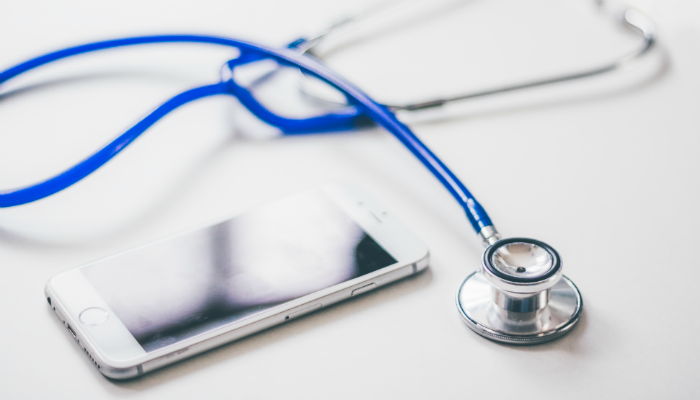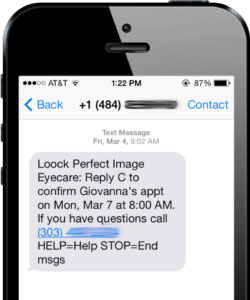
post
April 14, 2016
Why Texting Is Great for Medical Appointment Reminders and Medication Adherence
I recently got an appointment reminder from my eye doctor asking me to confirm my appointment over text messaging (see below).

It was quick and easy to confirm my appointment—all I had to do was type “C” and that was that. (It was also a great way for me to remember that I had an appointment!)
But texting medical appointment reminders didn’t just help me—it’s helped a lot of other patients. In fact, science shows that texting medical appointment reminders is a great way to reduce the no-show rate.
Texting for medical appointment reminders
As we’ve discussed before, text messages have a 98% open rate and a 45% response rate. This makes them an ideal channel for patient communication, since you want to make sure patients are attending the appointments they need to and communicating their availability back to you. In fact, research has shown that no-show rates can range from 5.4% to 50.2% in hospital outpatient clinics.
Several studies have demonstrated the power of texting for medical appointment reminders:
- A study published in the Journal of Taibah University Medical Sciences found that nonattendance rates at general medicine and neurology clinics were “significantly lower” compared to the control groups that didn’t receive appointment reminders.
- A study published in the International Journal of Medical Informatics found that nonattendance reduction rates for outpatient clinics were as high as 14% for groups that received an appointment reminder.
- A literature review in the Journal of Telemedicine and Telecare found that did not attend (DNA) rates improved 39% when messages were sent manually, and 29% when messages were sent using automation.
Texting is a great way to reduce no-show rates, given its familiarity, ease of use and high open rate. But in addition to being used for medical appointment reminders, texting can also be used for medication adherence.
Texting for medication adherence
Taking medicine on a consistent basis is an important part of most healthcare regimens. However, research has shown that medication adherence is often poor for people with chronic diseases, affecting 50 to 60% of patients. This poor medication adherence costs patients about $2,000 a year for extra visits to the doctor, and causes a $100 billion increase in healthcare costs in North America every year.
Texting’s high open rate and response rate, as well as its low cost compared to mobile apps, makes it a great medication adherence tool. One study found that 93% of participants in medical adherence studies read messages reminding them to take their medicine. In addition, studies have actually documented the power of SMS and how it improves medication adherence. Check out a few summaries below:
- A study published in the Journal of the American Medical Association, Internal Medicine found that texting doubles the odds of medication adherence in patients with chronic diseases. The study was conducted in 16 clinical trials—five of the 16 trials used personalization, eight of the trials used two-way communication, and eight of them sent daily text messages.
- Another study published in the Journal of the American Medical Association, Internal Medicine tested how text messaging impacted smoking cessation between participants around 21 to 30 years old. The participants in the intervention group received 157 texts over 12 weeks, while the control group only received one text every two weeks. Over 25% of intervention group participants had abstained from smoking eight weeks later, while only 14.6% in the control group did.
- A study published in the Journal of the American Medical Informatics Association found that text reminders, electronic reminder devices and pager notifications for patients with various medical conditions helped improve their medication adherence. Reminders sent over text message were “especially effective,” according to the researchers.
- In a medical literature review, researchers found that in one study, patients who received medication reminders and educational messages strongly agreed that text message reminders helped them take their medication.
- One study published in the British Journal of Health Psychology tested the effectiveness of personalized asthma preventer medication reminders over a sixth month period. They found that average self-reported adherence over all time points for the intervention group was 57.8%, compared to 43.2% for the control group.
Using text messaging for medication adherence can help keep patients out of the hospital after their treatment, as well as help patients maintain an active healthcare regimen after being in the hospital.
Conclusion
In today’s busy world, it can be hard for patients to remember to go to an appointment or take their medicine on time. Practices that leverage the power of text messaging to communicate with their patients will be able to provide a great patient experience and meet their business goals.
To learn more about adding texting to your business, download our whitepaper here.
Image of stethoscope courtesy of StockSnap. CC0 License.
Stay up to date
Latest Articles



![7 Reasons Why Texting Is Great for Customer Service [SLIDESHARE]](https://onereach.ai/wp-content/uploads/2023/11/texting-great-customer-service-pink-150x150.png)
